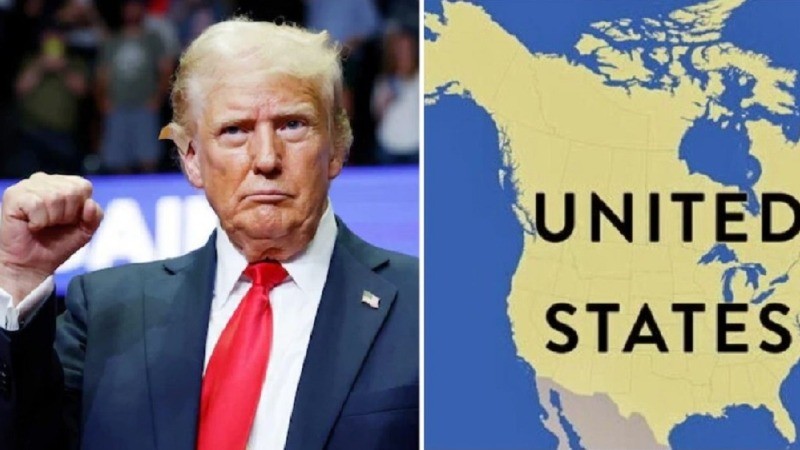
President-elect Donald Trump has ignited a new controversy by sharing maps on social media that falsely depict Canada as part of the United States. His bold claims have sparked outrage among Canadian officials and raised concerns about potential strain in U.S.-Canada relations.
Provocative Maps and Bold Statements
Trump posted a series of maps on his Truth Social account that portrayed Canada as integrated into the United States. One map showed Canada and the U.S. merged under a single label, “United States,” while another featured both nations draped in the colors of the U.S. flag with the caption, “Oh Canada!”
Donald Trump claimed that several Canadians are eager to join the United States. He argued that such a union would eliminate trade tariffs, reduce taxes, and enhance security against foreign threats. Trump also suggested that Canadian Prime Minister Justin Trudeau’s potential resignation is linked to Canada’s alleged dependence on U.S. support.
Bold Annexation Ambitions
During a recent news conference, Trump hinted at ambitions to acquire or annex foreign territories, mentioning Greenland, the Panama Canal, and, indirectly, Canada. He did not rule out the use of military force to achieve such objectives, particularly with Greenland and the Panama Canal. Regarding Canada, Trump provocatively remarked that the country is already—or will soon become—the “51st state” under his administration.
Strong Pushback from Canadian Leaders
Canadian officials were quick to condemn Trump’s comments. Foreign Affairs Minister Mélanie Joly dismissed the claims as baseless, emphasizing Canada’s resilience and independence. She took to X (formerly Twitter) to reaffirm the country’s strength, stating that Canada would not succumb to any external pressure or threats.
Ontario Premier Doug Ford responded with humor but firmly rejected Trump’s rhetoric. He joked about a counteroffer to “buy Alaska, Minnesota, and Minneapolis” but assured Canadians that their sovereignty was not negotiable.
Potential Implications for U.S.-Canada Relations
While the idea of Canada becoming part of the U.S. is far-fetched, Trump’s remarks have raised concerns about the future of diplomatic ties between the two nations. Historically, U.S.-Canada relations have been strong, marked by robust trade and mutual cooperation. However, Trump’s provocative statements, coupled with his plans to impose tariffs on all imported goods, could create economic and political tensions.
As Canadian leaders remain steadfast in defending their nation’s sovereignty, Trump’s rhetoric poses challenges to maintaining the traditionally friendly relationship between the neighboring countries. The controversy underscores the potential impact of his statements on bilateral relations and global diplomacy.
International Disputes Over Geographic Names: A Closer Look
Disputes over place names are not uncommon, as countries seek to assert their historical, cultural, or political claims. These disagreements can often be tied to sensitive histories and territorial disputes, with nations fiercely defending the names they believe are rightfully theirs.
Sea of Japan: A Contested Identity
One long-standing dispute involves the name of the Sea of Japan, which is contested by Japan, North Korea, South Korea, and Russia. South Korea argues that the name "Sea of Japan" gained prominence only during Japan’s colonial rule over Korea, and it advocates for the name "East Sea" instead.
In 2020, the International Hydrographic Organization (IHO) took steps to address the controversy. At a meeting that year, member states proposed replacing geographic names with numerical identifiers in digital standards for modern geographic information systems. This plan aims to depoliticize cartographic naming conventions while improving global consistency.
Persian Gulf: A Name Under Debate
The Persian Gulf has been a widely recognized name for the body of water separating Iran and the Arabian Peninsula since the 16th century. However, alternative terms like "Gulf" and "Arabian Gulf" are more commonly used in some Middle Eastern nations. This divergence has fueled tensions, particularly with Iran, which views the use of alternate names as an affront to its heritage.
In 2012, Iran threatened legal action against Google after the tech giant omitted any label for the Persian Gulf on its maps. The move highlighted how sensitive geographic names can ignite diplomatic disputes and even influence global tech policies.
The South China Sea: A Historical Perspective
Another notable example stems from the South China Sea, where China’s expansive territorial claims have stirred international tensions. Former U.S. Secretary of State Hillary Clinton, during a 2013 speech, offered a sharp critique of China's position. According to documents leaked by WikiLeaks, she remarked that, by China’s logic, the United States could have named the Pacific Ocean the “American Sea” after World War II.
Her comment underscored the broader implications of naming disputes, where geographic terms often serve as symbols of sovereignty and power.
Naming Disputes Reflect History and Politics
The ongoing disputes over geographic names underscore the intersection of history, politics, and national identity. Whether it’s the Sea of Japan, the Persian Gulf, or the South China Sea, these debates go beyond mere cartography—they represent struggles for recognition, influence, and sovereignty in an interconnected world.